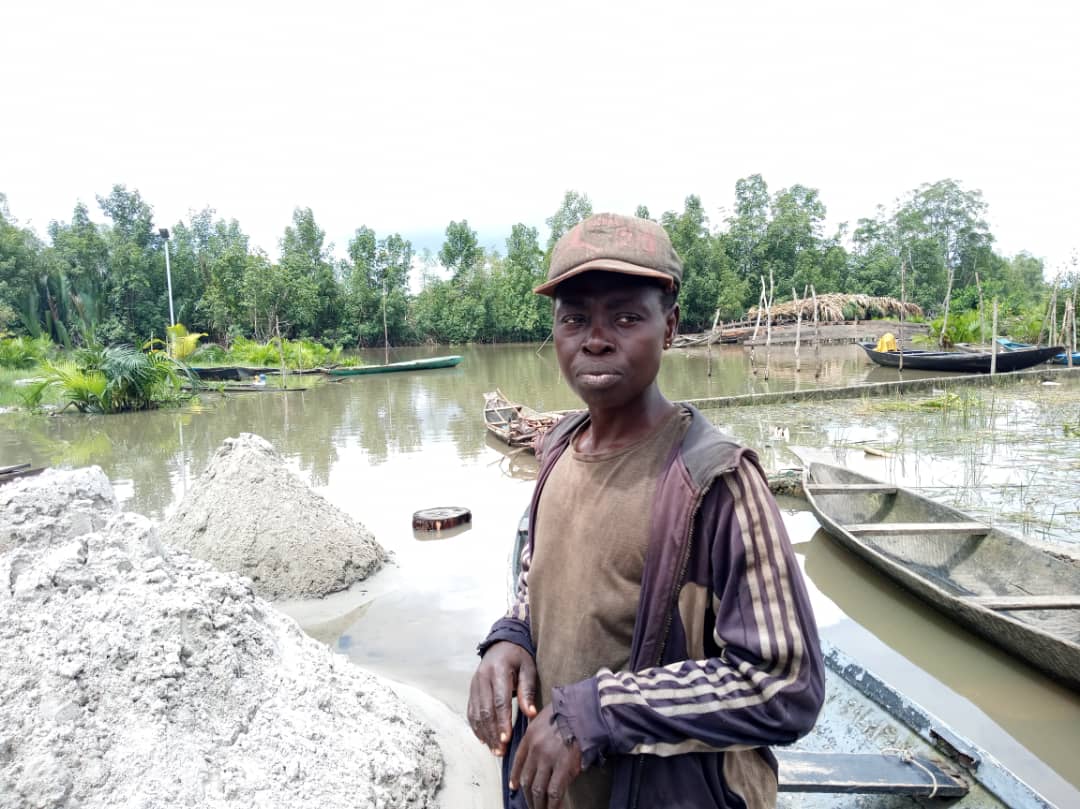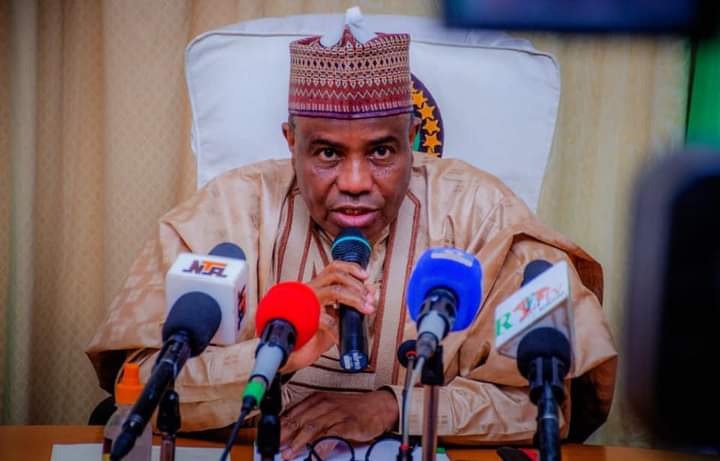In the Niger Delta region of Nigeria, an average of 17,000 litres of crude oil was spilled daily from 2012 to 2021. The region has been battling environmental degradation since Nigeria discovered crude oil in 1956 in a community called Oloibiri in Bayelsa state. Owing to recurring spills, exploration in oil-producing communities has negatively impacted the residents. This report by AYODELE OLUWAFEMI highlights how oil spills threaten the livelihood of women who engage in fishing and destroy the mangrove ecosystem in Bayelsa.
Grace James, a middle-aged fisherwoman who has been in the business for over two decades, sat beside a smoke-emitting kitchen at Bassambri community, Nembe LGA of Bayelsa, as she weaved a new fishing net. The mother of six has been making fishing nets for the last few years, owing to the devastating effects of oil spills on fishing activities.
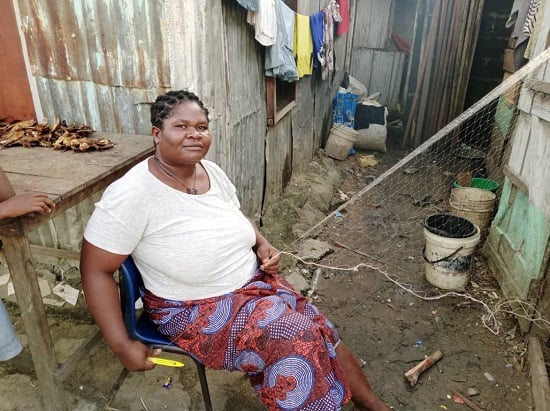
Grace said recurring oil spills around the Nembe water axis and nearby areas have resulted in the migration of aquatic animals, especially fish.
“Because of the frequent oil spill, I no longer have the keen desire to go fishing again, despite fishing for many years,” she said in her dialect. “But I don’t have another alternative. It is sad that fish are migrating from our community.”
Advertisement
As a result of the situation, it has become increasingly difficult for Grace and her husband to fend for their children, who are in primary and secondary schools.
Grace recounted how a major oil spill at Santa Barbara South field in Nembe polluted the water bodies in the area and hindered her from fishing for months.
The wellhead — jointly owned by Aiteo Eastern Exploration and Production Company (AEEPCO) and the Nigerian National Petroleum Corporation (NNPC) — blew up on November 5, 2021, polluting the water bodies around many communities in Nembe for over a month.
Advertisement
Amid the spillage, Aiteo said it distributed relief materials such as mosquito nets, hygiene and sanitary kits, disinfectants, and food materials to the affected communities. However, Grace said those who engage in the fishing business were sidelined.
“When the oil companies brought relief materials, we who engage in fishing as a business, we don’t get such materials,” she lamented.
OIL SPILLS A MAJOR ENVIRONMENTAL DEGRADATION FACTOR
According to data extracted by TheCable Index from the oil spill monitor website of the National Oil Spill Detection and Response Agency (NOSDRA), Niger Delta communities recorded 8,810 reported cases of oil spills — amounting to 393,087 barrels of oil — from 2012 to 2021.
Advertisement
In the 10-year period, the reported figures of oil spill cases were equivalent to 62.1 million litres of crude oil, and by implication amounts to 1,965 fuel tankers.
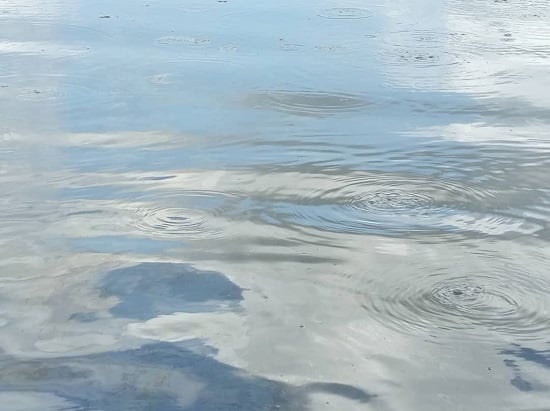
Sabotage, equipment failure, and operational/maintenance errors have been said to be the major causes of oil spills in Niger Delta communities.
Frequent oil spills have led to the pollution of water bodies and lands — a development that hurts the survival and livelihood of residents, who mostly engage in farming and fishing.
Aside from the environmental pollution caused by frequent oil spills, methane, a natural gas emitted during the spewing of crude oil, has been found to reduce the oxygen percentage in the air, making residents prone to suffocation.
Advertisement
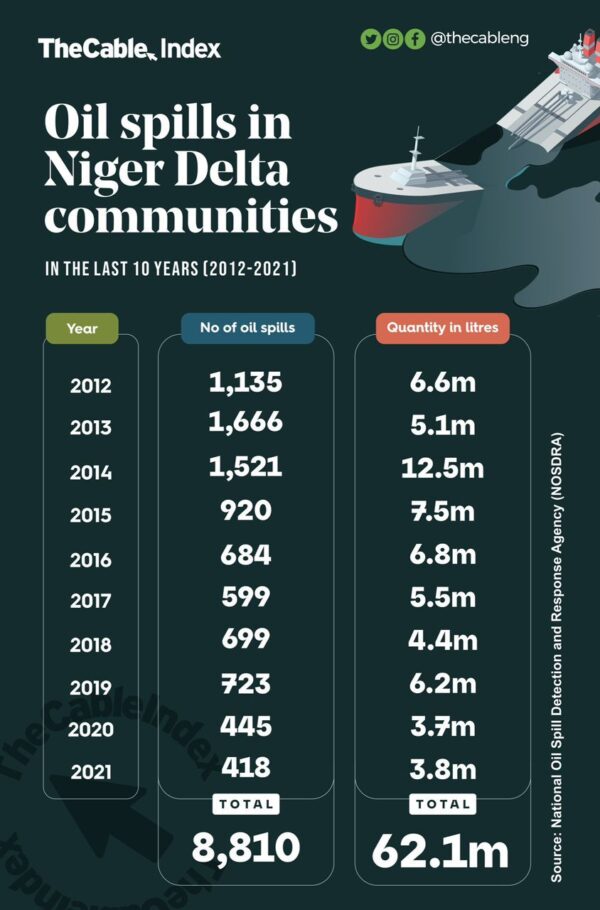
OIL SPILLS CRIPPLING BLUE ECONOMY
Advertisement
Inemo Igbogi, 55, resides in the Ogbolomabiri community of Nembe. As a mother of seven who is the breadwinner of her family, fishing is her only viable means of livelihood.
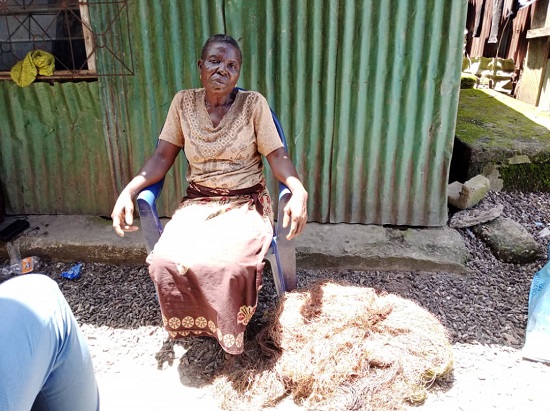
Like Inemo, many women in Niger Delta communities explore the potential of blue economy for the creation of wealth for the sustenance of their families.
Advertisement
The World Bank defines blue economy as the sustainable use of ocean resources for economic growth, improved livelihoods, jobs and the ocean ecosystem’s health.
According to the United Nations Conference on Trade and Development (UNCTAD), women make up most of the workforce in the coastal and fishery sectors of the blue economy. The UN body added that women play key roles in ensuring a reliable supply of food from the ocean, which three billion people depend on for their daily source of protein.
Advertisement
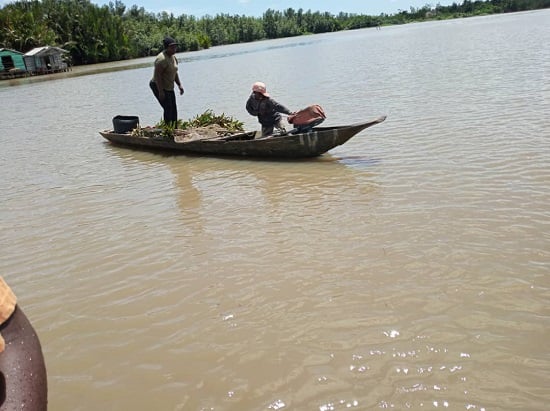
However, the exploration of crude oil in these communities has negatively affected the blue economy, especially as it relates to fishing.
Narrating her plight, Inemo bemoaned how frequent oil spills have led to a decline in her income owing to the pollution of water bodies and the subsequent exodus of aquatic animals.
“I started this fishing occupation many years ago. Some years ago, I usually catch fish and crayfish worth around N15,000 or N10,000 in a single day,” she said.
“But now, I hardly catch fish worth N5,000 or N4,000 in one day. When I go to fishing camp, I hardly get fish like tilapia, mullet and catfish. This has brought me and my children nothing but hunger. Paying school fees for my children has become something very hard.”
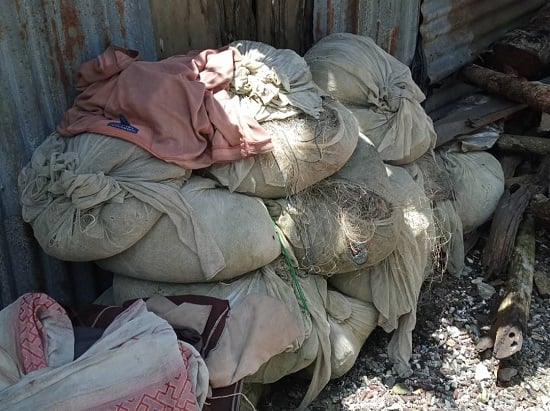
Aside from the economic implications of oil spills, the fisherwoman lamented that the many mangroves in the oil-rich community have dried up due to frequent contact with crude oil.
According to research published in Global Change Biology, mangroves can store large amounts of carbon for long periods and reduce greenhouse gas emissions. Also, mangroves are an important natural solution for climate change as they help reduce global warming by absorbing the carbon dioxide in the atmosphere.
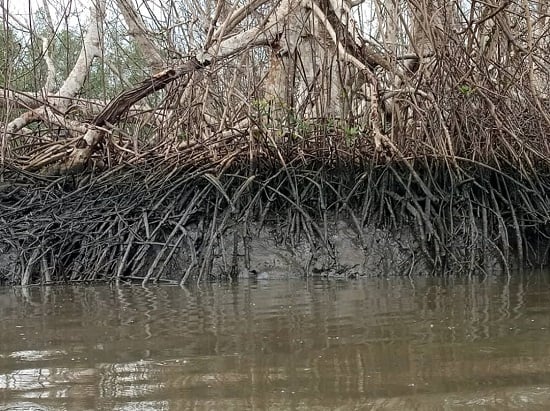
Elizabeth Waka, who has been fishing in the Bassambiri community of Nembe for 22 years, is also forced to contend with the negative impacts of oil spills.
Apart from the effect on her income, she says the constant exposure to crude oil has affected her breathing pattern. Waka said she once considered ditching the occupation for trading but the lack of required resources to set up shop forced her to have a rethink.
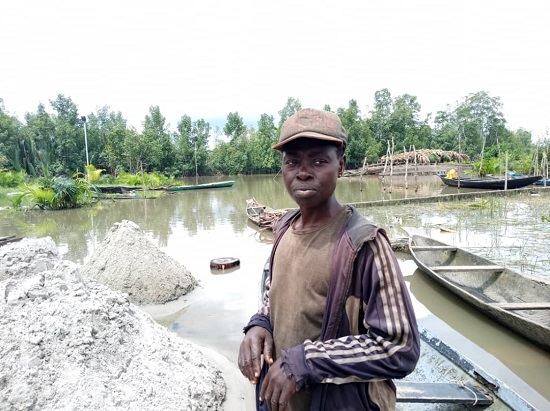
“I have been fishing for a good twenty-two years. Anytime, crude oil pipeline bursts in this community there will be no fresh fish to catch for many days, you will only see the dead ones,” she lamented.
‘OIL SPILLS FUEL POVERTY AMONG WOMEN’
In a bid to address environmental degradation in the Niger Delta, the federal government established NOSDRA and the Hydrocarbon Pollution Restoration Project (HYPREP) under the ministry of environment.
While NOSDRA was established in 2006 to implement the National Oil Spill Contingency System (NOSCS) in compliance with International Convention on Oil Pollution Preparedness Response and Cooperation on Oil Pollution Preparedness Response and Cooperation, HYPREP was set up in 2016 to coordinate and implement environmental clean-up exercises in Ogoniland and other impacted communities.
Over the years, the federal government has spent billions of naira to undertake environmental remediation programmes in the oil-polluted communities but residents and stakeholders believe that the government has not done enough.
Veronica Joseph, an environmental activist and founder of Voice of River Widows and The Girl-Child Initiative (VEANI), said recurring oil spills have worsened poverty and suffering among women.
“Before now, a woman can go to the fishing port, catch fish, take them to the market to sell, use the proceeds to train her children conveniently and consume the remaining ones but now things have changed,” she said.
“Getting a small quantity of fish to feed is a problem much less selling them to pay children’s school fees and meet other needs.
“At the moment, in most Niger Delta communities, women now depend on imported fish because they can no longer get enough from their environment despite large space of water bodies.”
Experts and activists believe that as Nigeria continues to explore crude oil in the Niger Delta, environmental degradation will keep getting worse if there are no adequate measures to combat spills, while women who engage in fishing and farming will continue to struggle to survive.
This report was completed as part of the Centre for Journalism Innovation and Development’s 2022 Climate Change Media Fellowship in West Africa with funding support from the Centre for Investigative Journalism’s Open Climate Reporting Initiative (OCRI).
Add a comment
